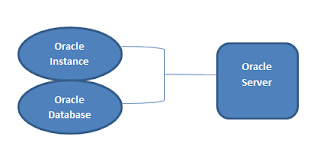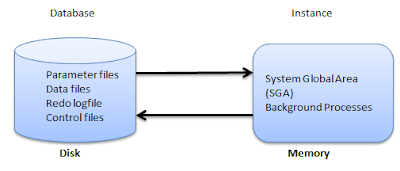1.
SGA (System
Global Area)
The SGA is a
read/write memory area that stores information shared by all database processes
and by all users of the database (sometimes it is called the Shared Global
Area).
- The SGA is allocated in memory and virtual
memory.
- The size of the SGA can be established by a DBA
by assigning a value to the parameter SGA_MAX_SIZE in the
parameter file—this is an optional parameter.
The SGA is allocated
when an Oracle instance (database) is started up based on values specified in
the initialization parameter file (either PFILE or SPFILE).
The SGA has the
following mandatory memory structures:
- Database Buffer Cache
- Redo Log Buffer
- Java Pool
- Streams Pool
- Shared Pool – includes two components:
1. Library Cache Data
2. Dictionary Cache
Additional
optional memory structures in the SGA include
- Large Pool
Note: Early versions of Oracle used a Static SGA. This meant that if modifications to memory management were required, the database had to be shutdown, modifications were made to the init.ora parameter file, and then the database had to be restarted.
Oracle 11g uses a Dynamic SGA. Memory configurations for the system global area can be made without shutting down the database instance. The DBA can resize the Database Buffer Cache and Shared Pool dynamically.
Memory is allocated to
the SGA as contiguous virtual memory in units termed
granules. Granule size depends on the estimated total size of the
SGA, which as was noted above, depends on the SGA_MAX_SIZE
parameter. Granules are sized as follows:
- If the SGA is less than 1 GB in total,
each granule is 4 MB.
- If the SGA is greater than 1 GB in
total, each granule is 16 MB.
Granules are assigned to
the Database Buffer Cache, Shared Pool, Java Pool, and other memory structures,
and these memory components can dynamically grow and shrink.
2. Program Global
Area (PGA)
A private memory region
that contains the data and control information for a server process. Only a
server process can access the PGA. Oracle Database reads and
writes information in the PGA on behalf of the server process. There
is one PGA for each server process. Background processes also allocate their
own PGAs.
3. User
Global Area
The User Global
Area is session memory.
The UGA must be
available to a database session for the life of the session. For
this reason, the UGA cannot be stored in the PGA when using a shared
server connection because the PGA is specific to a single
process. Therefore, the UGA is stored in the SGA when using shared
server connections, enabling any shared server process access to it. When using
a dedicated server connection, the UGA is stored in the PGA.
END OF NOTES
Follow : http://ithelpdeskinc.com/






